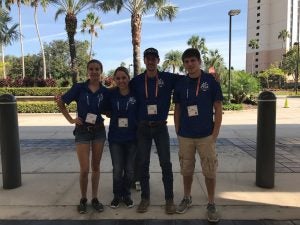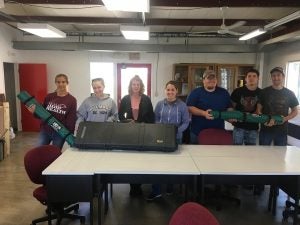Dr. Ryan Anderson has a rich history in agriculture. Immersed in his mother’s family farm, 4-H, and FFA growing up, the Illinois native went on to get several degrees in ag, including a doctorate in Career and Technical Education from Virginia Tech. He served as the assistant professor of agricultural systems management for four years at Murray State University. He then spent the next seven as an assistant professor of agricultural education at Iowa State.
So imagine the challenge Anderson accepted in June 2017 when he joined Sauk Valley Community College, a secondary educational institution in Dixon, Illinois, that hasn’t had a production ag class since 1986.
“We have experienced significant growth in my opinion,” Anderson said. “We started with nine students in our classes last semester with a 90 percent retention rate; we are now over 24 students (only one is graduating). I am projecting that we surmise 40 students in the fall.”
Anderson’s goal for the first year was to develop a course to support an ag transfer degree and then build courses for an applied associates degree in agribusiness. Both programs took off.
Now the professor is working on adding an agricultural mechanics applied associates degree and is splitting the SVCC pre-vet degree into two tracks, with one being held in the agriculture department. Students can begin enrolling in both of those programs in the fall. In 2019, Anderson hopes to unroll a farm-to-fork applied associate’s degree.

“The students have enjoyed my teaching style,” Anderson said. “I use team-based learning, which is a form of flipped learning which put the students in an active learning environment. I also work to ensure all of our application exercises have direct ties to industry and real-world settings.”
This fall Anderson will be taking that teaching style one step further — to high schools in the area.
“I have also been able to split part of my time this semester to recruit students in each of the high schools that have an agricultural education program, so far I have visited all but three of those schools with two more of those schools on my schedule for next week,” Anderson said.
According to Anderson, research shows that the reason most students pursue an agriculture degree is due to the influence of secondary agricultural education teachers.
“Knowing this, I thought it was important to help the schools in our district that did not offer agricultural education identify options to help their students,” Anderson said.
He initially reached out to the four largest schools in the district that did not have ag ed to gauge their interest in offering dual-enrolled courses online and to see if they would support a grant project that would fund a curriculum development project. While they did not receive the grant, Anderson said the amount of excitement around the grant snowballed and they decided to proceed even without the external funding.
Now Anderson has started an online course for the high school level this fall that is focused on taking a deep, but broad dive into current agricultural hot topic issues.
“From local to national topics, the course is designed to increase a student’s understanding of these issues and allow them to discuss and form critical thinking skills to communicate these issues to today’s consumers,” Anderson said.

The course will include ag issues such as the environment, animal welfare, crop production, biotechnology, and consumer attitude towards agriculture and food production. The course will also spend time digging into current marketplace issues, including consumer confusion with marketing claims on food labels, understanding the history and controversy with GMOs, and learning best practices for transparency in agriculture today.
Students taking the course will get to participate in weekly online discussions with other classmates, watch videos and read current online information on issues, and prepare position statements to share with the class on topic areas of their interest.
Anderson said the online course, which is four credit hours, is open to any student with an interest in agriculture and learning more about where their food comes from. And if there is potential interest, Anderson said they may add either a farm business management or soil science class online this fall as well.
SVCC currently has an agreement with Dixon High School — the largest school in Lee County — that hasn’t had ag education since 1986 due to budget constraints. Anderson hopes to get Rock Falls and Sterling Newman on board next and said there is potential to work with nine other secondary schools in the district that do not have ag education.
Anderson’s end goal is two-fold. First he hopes to generate enough student interest that each of the non-ag ed schools establishes their own agricultural education programs. Secondly, he hopes those programs become successful and it further encourages their students to pursue careers in agriculture and get their start at SVCC.
Anderson advises other ag college instructors to reach out to students at the high school level.
“We often take for granted that students are well informed about their college choices and the options available to them based on the sheer amount of information that we post online and our overall reputations,” Anderson said. “The reality is most students still struggle to identify a career path and are often disengaged with what is happening in their own backyards.”



